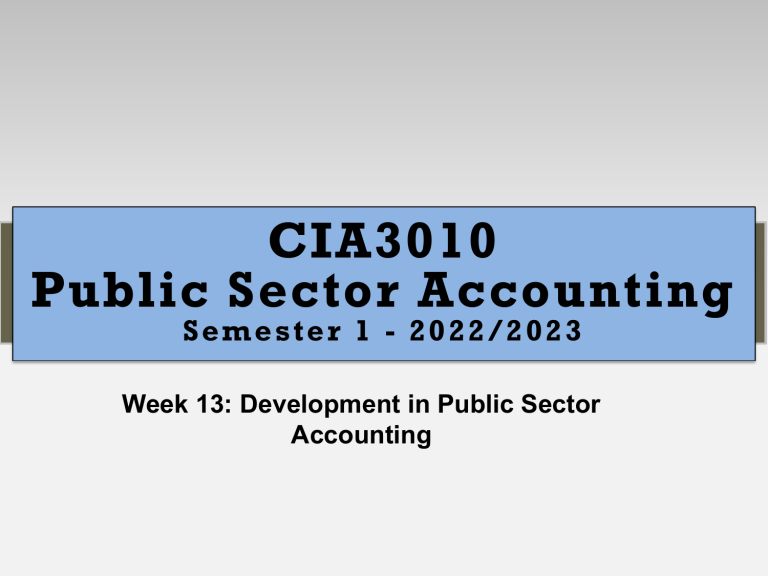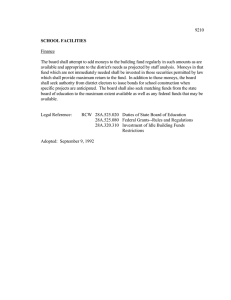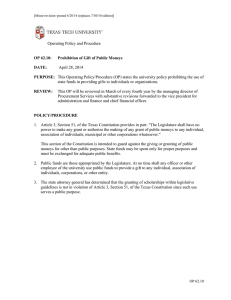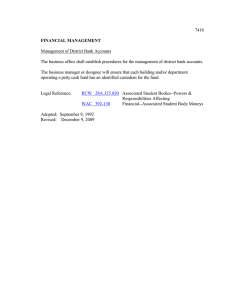
CIA3010 Public Sector Accounting Semester 1 - 2022/2023 Week 13: Development in Public Sector Accounting Outline • • • • Public Sector Reforms Governance Emerging Issues Unclaimed Moneys Public Sector Reforms • Public sector is entrusted with a twin task: » Socio economic development » Nation building • Series of reforms or modernization were undertaken • Factors: » Environmental (economic conditions and societal demands) » Developmental policies » Objectives of government • Referred to as new public management (NPM) or new public financial management (NPFM) • Associated with “doctrines of public accountability and organizational best practice” • Involved deliberate changes to the structures and processes of public sector organisations with the objectives of getting them (in some sense) to perform better. Emergence of public sector reforms • Inputs » Public sector was seen to require unsustainably large and/or unsustainably increasing public expenditure. • Processes » There was concern about inefficiency in the use of public resources – waste, delay, mismanagement and corruption • Outputs » Concerns were widespread that the public sector was not delivering what it should be. NPM Characteristics • • • • • • • Hands on management Focus on outputs Private sector-based management Emphasis on economy and cost cutting Decentralization Competition Citizen oriented Changes in Public Sector Accounting • More in line with the private sector accounting. • Emphasis of accounting changed from showing stewardship and accountability to measuring performance and efficiency in the public sector. • Adopted accrual accounting and budgeting » Accountability and transparency » Goals and performance requirements » Dysfunctional behavior related to spending » Poor asset and liability management » Important accounting information not reported » Global competitive forces that demand efficiency for survival PSR in Malaysia Economic Policies, Economic Development Plans and Nature of Public Sector Reforms in Malaysia Economic Policy Period Economic Development Plan 1966 - 1970 1st Malaysia Plan 1971 – 1975 2nd Malaysia Plan 1976 – 1980 3rd Malaysia Plan 1981 – 1985 4th Malaysia Plan 1986 – 1990 5th Malaysia Plan New Development Policy (NDP) 1991 – 1995 6th Malaysia Plan 1996 – 2000 7th Malaysia Plan National Vision Policy (NVP) 2001 – 2005 8th Malaysia Plan 2006 – 2010 9th Malaysia Plan New Economic Model (NEM) 2011 – 2015 10th Malaysia Plan 2016 - 2020 11th Malaysia Plan Pre-New Economic Policy New Economic Policy (NEP) Nature of Public Sector Reforms Economic reforms Public administrative reforms Financial performance management New Public Sector Governance • “Public sector governance encompasses the policies and procedures used to direct an organization’s activities to provide reasonable assurance that objectives are met and that operations are carried out in an ethical and accountable manner. In the public sector, governance relates to the means by which goals are established and accomplished. It also includes activities that ensure a government’s credibility, establish equitable provision of services, and assure appropriate behaviour of government officials — reducing the risk of public corruption.”1 • Aims: to ensure that an organization achieves its overall outcomes in such a way as to enhance confidence in the organization, its decisions and its actions.2 • Focuses on: » Performance – the effective and efficient delivery of goods, services or programs » Conformance – adherence to the law, regulations, published standards, and community expectations of probity, accountability and openness. 3 Institute of Internal Auditors, “The Role of Auditing in Public Sector Governance”, (Florida USA: 2006), p. 3. Australian National Audit Office, Public Sector Governance, Volume 1: Better Practice Guide, (Canberra: 2003), p. 6. 3 Ibid. Note: the term “compliance” can interchangeably be used with “conformance”. 1 2 Principles of Good Public Sector Governance 1. Rule of law – law is above everyone and is applied fairly to everyone, whether the governor or governed (external control) 2. Transparency/Openness – citizens’ right to have access to information about what government is doing and how decisions have been reached; appropriate disclosure of key information. 3. Accountability – public sector entities, and the individuals within them take responsibility for their decisions and actions, including their stewardship of public funds and all aspects of performance. 4. Public sector ethics and probity – adhere to a set of moral principles, standards, or values that govern their conduct, and to act with complete honesty and integrity (internal control) 5. Stewardship – refers to government officials carefully managing the power and resources entrusted to them in a manner that is consistent with the public interest. Act prudently, ensure fiscal sustainability. 6. Leadership – setting the “tone at the top”, leaders within public service promote and support the principles of good public sector governance by leadership and example. 9 Unclaimed Moneys (Wang Tak Dituntut) https://egumis.anm.gov.my Learning Outcomes • Explain the concept of unclaimed moneys • Explain the prevailing regulations of unclaimed moneys in Malaysia under the Unclaimed Moneys Act 1965 • Understand the submission process of unclaimed moneys in Malaysia • Discuss the non-compliance issues with regard to the Unclaimed Moneys Act 1965. Introduction • In broad terms, unclaimed moneys refer to an amount of money to be paid legally to a proper recipient within a certain period of time as specified in the Unclaimed Moneys Act 1965. • The Unclaimed Moneys Act 1965 is an Act relating to the payment of unclaimed moneys into the Federal Consolidated Fund. Unclaimed Moneys Act 1965 (cont.) • Under the Unclaimed Moneys Act 1965, the sums of moneys, which have existed for a specified period of time and have yet to be claimed by the rightful owners, will be transferred to the Registrar of Unclaimed Moneys. • The Accountant General of Malaysia was appointed as the Registrar of Unclaimed Moneys effective from 1 June 1975. • The owner of the unclaimed moneys may recover the moneys from the Registrar either in person or in writing. Unclaimed Moneys Act 1965 (cont.) • The Unclaimed Moneys Act 1965 also details the entities that must comply with the Act as well as the penalties incurred for non-compliance with the provisions of the Act. • ‘Owners’ in the context of the Unclaimed Moneys Act 1965 refer to the person or party entitled to any unclaimed moneys, which include his or her executors, administrators or assigns; whereas in the case of a company that is governed by the Companies Act 2016, this may include its liquidators, or its lawful attorneys or agents in Malaysia. Unclaimed Moneys Act 1965 (cont.) Classification of Unclaimed Moneys • Moneys which are legally payable to the owner but has remained unpaid for a period of not less than one year • Moneys appearing in an account that has not been operated in whatever manner by the owner for a period of not less than seven years • Money appearing in a trade account that has remained dormant for a period of not less than two years Unclaimed Moneys Act 1965 (cont.) Who Should Comply with the Provisions of the Unclaimed Moneys Act 1965 • A company incorporated under the provisions of Companies Act 1965 (or foreign companies as specified under Division 2 of Part XI of the same Act) Boards established to manage funds relating to retirement benefits; • All registered societies and cooperative societies; • Corporations, public authorities and trade unions; • Firms (i.e. unincorporated body of persons associated together to carry out business). Unclaimed Moneys Act 1965 (cont.) Organizations or parties that are required to comply with the provisions of the Unclaimed Moneys Act 1965 Unclaimed Moneys Act 1965 (cont.) Role of the Registrar of Unclaimed Moneys • The Registrar is responsible for carrying out the obligations and functions vested under Part II of the Unclaimed Moneys Act 1965 as follows: (1) As trustee to the unclaimed moneys received (2) To refund the unclaimed moneys to claimants who provide proof that he has a legal right over the money to be claimed (3) To inspect the records of company or firm to ensure compliance with the provisions of the Act (4) To suggest the imposition of compound and penalty on company or firm that has committed an offence under the Act. Submission of Unclaimed Moneys Submission Process and Relevant Sections • According to Section 10 of the Unclaimed Moneys Act 1965, the firm/company is responsible for the following: (1) maintain a record of all unclaimed moneys in a register to be kept at its principal office or place of business in Malaysia in the form to be determined by the Registrar (2) lodge the unclaimed moneys with the copy of the register not later than 31 March of the following year (3) submit unclaimed moneys register for the purposes Gazette (4) starting from 2016, submissions of Unclaimed Moneys must be done through Online Banking. Submission of Unclaimed Moneys (cont.) Refund of Unclaimed Moneys • According to Section 13(1) of the Unclaimed Moneys Act 1965, when Registrar satisfied that the claimant is the owner of the money, the Registrar shall pay the money from Consolidated Trust Account or Consolidated Revenue Account. • There is no time limit for the application of the unclaimed moneys claim. • The claimant can check an apply for refund directly from the Registrar's office • The Registrar of unclaimed moneys has never appointed any firms or individuals to act as agents for the refund • Starting from 2018, the claimant can check through online. Currently, the Accountant General Department is still developing the website. Submission of Unclaimed Moneys (cont.) Submission process of unclaimed moneys for 2018 (Source: Accountant General’s Department of Malaysia) Non-compliance with the Unclaimed Moneys Act 1965 • A firm which fails to comply with sections 10(1) and (2) is guilty of an offense and the firm and every officer of the firm may be fined not exceeding RM20,000 and a further fine not exceeding RM1,000 for each day during which the offence continues ‒ s 10(4), Unclaimed Moneys Act 1965 • Section 12 of the Act empowers the Registrar or any person authorized by him to carry out inspection of the records to ascertain whether a company or firm is complying with the provisions of the Unclaimed Moneys Act 1965 Non-compliance with the Unclaimed Moneys Act 1965 (cont.) • The Registrar or any person authorized by him may also seize any books, registers, records or documents in order to furnish evidence of non-compliance of the Unclaimed Moneys Act 1965 by the company or firm • There are two important documents that need to be produced to the company or firm by the authorized officer to carry out the inspection: (a)Authority warrant (b)Secrecy declaration Non-compliance with the Unclaimed Moneys Act 1965 (cont.) • According to section 12(4) of the Act, a company or firm and every officer of the company or firm may face a penalty of a fine not exceeding RM5,000 or an imprisonment for a term not exceeding three months or both, if the company or firm or the officer: (a) refuses to produce, avoid producing or prevent the production of any such book (including minute book), register, record or document when being required by the Registrar or a person so (b) refuses or fail to correct any error found in any such book (including minute book), register, record or document when being required by the Registrar or a person so authorized (c) obstructs or hinders the Registrar or person authorized while exercising any of the powers referred to in section 12(1). • the Registrar may, with the consent in writing of the public prosecutor, compound any offense committed by a firm and every officer of the firm not exceeding 50% of the amount of maximum fine for that offense by making a written offer ‒ S16(1), Unclaimed Moneys Act • Section 16(2) of states that an offer under section 16(1) may be made at any time after the offence has been committed, and if the amount specified in the offer is not paid within the time specified in the offer or within such extended period as the Registrar may grant, prosecution for the offence may be instituted at any time. Suggestions to improve the ways unclaimed moneys operate (1) Shift the ownership of unclaimed moneys from the Accountant General to firms (2) Amend the Unclaimed Moneys Act 1965 to make it mandatory for companies or firms to declare their amounts of unclaimed moneys (3) Distribution of incentives from the Accountant General’s Department to firms that comply with the rules or best practices (4) Amending the Unclaimed Moneys Act 1965 to be more proactive Revision • • • • Final examination (60%) Thursday 16 February 2023 (3.00 pm – 6.00 pm) 3 hours, 3 questions (total 60 marks) Course learning outcomes: 1. Describe the components of public sector, the structure of government and the legal requirements related to financial provisions (Test) 2. Discuss issues related to government management accounting and control, budgeting and performance (Test and Final) 3. Discuss issues related to government financial accounting, reporting, accounting standard and auditing (Assignment and Final) 4. Answer questions related to the importance of governance and accountability in the public sector(Assignment and Final)



